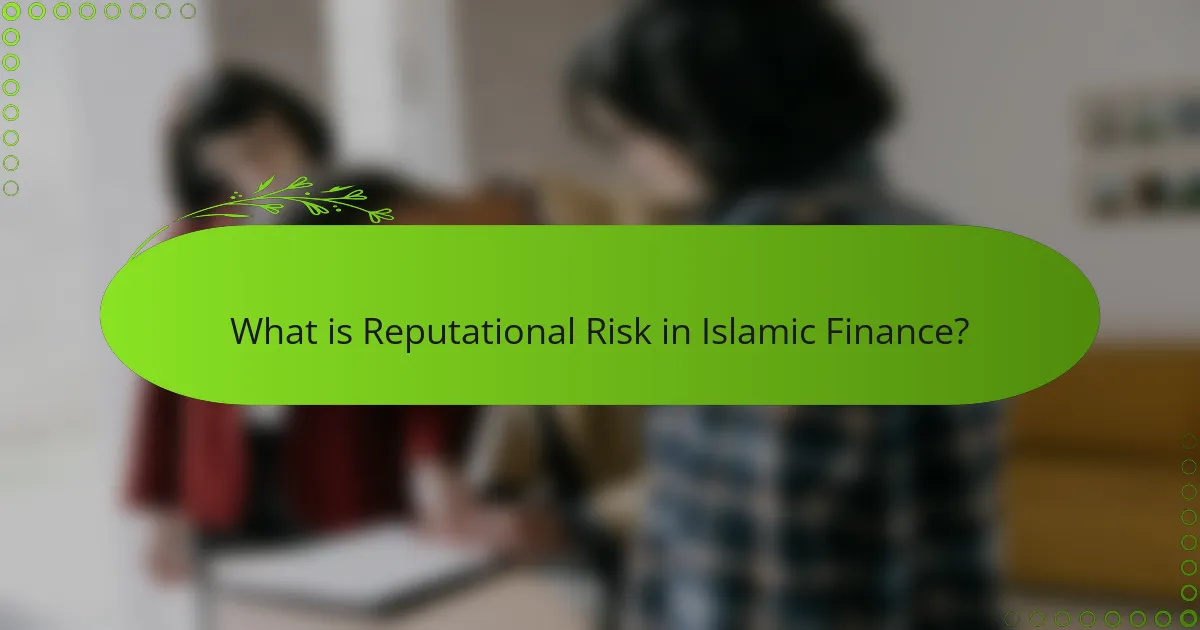
What is Reputational Risk in Islamic Finance?
Reputational risk in Islamic finance refers to the potential loss of reputation due to non-compliance with Islamic principles. This risk can arise from unethical practices, financial misconduct, or failure to adhere to Shariah law. Islamic finance institutions rely heavily on trust and credibility. A damaged reputation can lead to loss of clients and investors. Research indicates that 70% of Islamic banks consider reputational risk a top concern. This highlights the importance of maintaining compliance and ethical standards.
How is reputational risk defined within the context of Islamic finance?
Reputational risk in Islamic finance is defined as the potential loss of trust and credibility due to perceived non-compliance with Sharia principles. This risk arises when financial institutions fail to adhere to Islamic ethical standards. Non-compliance can lead to negative public perception and loss of customer confidence. A survey by the Islamic Financial Services Board indicates that reputational risk is a top concern for Islamic banks. Institutions must ensure transparency and ethical practices to mitigate this risk. Effective management strategies are essential to uphold their reputation in the market.
What specific characteristics distinguish reputational risk in Islamic finance from other financial sectors?
Reputational risk in Islamic finance is distinguished by its unique alignment with Shariah principles. This alignment necessitates adherence to ethical and moral standards, which are more stringent than in conventional finance. Islamic finance institutions face heightened scrutiny regarding compliance with these principles. Any deviation can lead to significant reputational damage. Additionally, the reliance on community trust and social responsibility amplifies the impact of reputational risk in this sector. Negative perceptions can arise from misinterpretation of Shariah compliance. This contrasts with other financial sectors, where regulatory compliance is often the primary focus. In Islamic finance, the cultural and religious dimensions play a crucial role in shaping reputational risk.
Why is managing reputational risk crucial for Islamic financial institutions?
Managing reputational risk is crucial for Islamic financial institutions because their operations rely heavily on trust and ethical practices. These institutions must adhere to Sharia law, which emphasizes fairness, transparency, and social responsibility. Any reputational damage can lead to loss of customer confidence and market share. According to a study by the Islamic Financial Services Board, 70% of consumers in Islamic finance prioritize ethical considerations in their financial decisions. Furthermore, negative publicity can result in regulatory scrutiny and increased compliance costs. Thus, effective reputational risk management is essential for sustaining credibility and ensuring long-term success in the competitive financial landscape.
What are the primary sources of reputational risk in Islamic finance?
The primary sources of reputational risk in Islamic finance include non-compliance with Sharia principles, mismanagement of funds, and negative media coverage. Non-compliance can arise from products or services that do not adhere to Islamic law. Mismanagement of funds can lead to financial losses and erode trust among stakeholders. Negative media coverage can amplify any existing issues, damaging the institution’s reputation. Additionally, lack of transparency and poor governance practices can also contribute to reputational risks. These factors can significantly impact customer trust and investor confidence in Islamic financial institutions.
How do regulatory challenges contribute to reputational risk?
Regulatory challenges contribute to reputational risk by creating uncertainty and potential non-compliance for organizations. When companies face regulatory scrutiny, it can lead to negative media coverage. This negative exposure can damage public perception and trust. Additionally, regulatory violations may result in fines or sanctions, further harming the organization’s reputation. For instance, a study by the Compliance, Governance, and Oversight Council found that organizations with regulatory issues often experience a 20% drop in customer trust. This illustrates the direct link between regulatory challenges and reputational harm. Thus, organizations must proactively manage regulatory compliance to mitigate reputational risks.
What role does public perception play in reputational risk?
Public perception significantly influences reputational risk. It shapes how stakeholders view an organization. Positive public perception can enhance trust and loyalty. Conversely, negative perceptions can lead to distrust and loss of customers. Research indicates that 70% of consumers consider a company’s reputation before making a purchase. Furthermore, a damaged reputation can result in financial losses and decreased market value. Companies with strong reputations are often more resilient during crises. Thus, managing public perception is crucial for mitigating reputational risk.

What strategies can be employed to manage reputational risk in Islamic finance?
Implementing transparency and strong governance frameworks are essential strategies to manage reputational risk in Islamic finance. Transparency builds trust with stakeholders by ensuring clear communication of financial practices. Strong governance frameworks help ensure compliance with Sharia principles, which is critical in Islamic finance. Regular audits and compliance checks further reinforce adherence to these principles. Engaging with stakeholders through open dialogue can also mitigate misunderstandings and enhance reputation. Additionally, training staff on ethical practices in Islamic finance promotes a culture of integrity. Monitoring social media and public perception allows institutions to address issues proactively. These strategies collectively create a robust approach to managing reputational risk effectively.
How can Islamic financial institutions develop a robust risk management framework?
Islamic financial institutions can develop a robust risk management framework by integrating Shariah compliance into their risk assessment processes. This ensures that all financial activities adhere to Islamic principles. Institutions should establish a dedicated risk management committee to oversee risk policies and procedures. Regular training for staff on risk management principles is essential. Implementing advanced risk assessment tools can enhance the identification and mitigation of risks. Additionally, institutions should engage in continuous monitoring and reporting of risks. Collaborating with regulatory bodies can provide guidance on best practices. Case studies show that effective risk management frameworks lead to enhanced trust and reputation in the market.
What key components should be included in a risk management framework?
A risk management framework should include key components such as risk identification, risk assessment, risk response, and monitoring. Risk identification involves recognizing potential risks that could impact the organization. Risk assessment evaluates the likelihood and impact of these risks. Risk response encompasses strategies to mitigate, transfer, accept, or avoid identified risks. Monitoring ensures ongoing oversight of risks and the effectiveness of the risk management strategies. Each component is critical for maintaining organizational resilience and compliance, particularly in sectors like Islamic finance where reputational risk is significant.
How can transparency and communication mitigate reputational risk?
Transparency and communication can significantly mitigate reputational risk by fostering trust and credibility. Clear communication helps organizations convey their values and commitments. This openness allows stakeholders to understand decisions and actions taken by the organization. Studies show that companies with transparent practices experience fewer negative perceptions during crises. For instance, a 2018 study by the Reputation Institute found that transparent companies had a 25% lower risk of reputational damage. Effective communication strategies also enable organizations to address issues proactively. This approach reduces misinformation and speculation, which can harm reputation. Overall, transparency and communication are essential in managing reputational risks effectively.
What proactive measures can Islamic financial institutions take to enhance their reputation?
Islamic financial institutions can enhance their reputation through transparency and ethical practices. They should implement clear communication strategies to disclose financial information. Regular audits by independent bodies can reinforce trust. Engaging in community development projects demonstrates commitment to social responsibility. Training staff on Sharia compliance improves service quality and customer trust. Establishing strong governance frameworks ensures ethical decision-making. Collaborating with reputable organizations can enhance credibility. Finally, addressing customer feedback promptly builds a positive relationship with clients.
How does community engagement impact reputational risk management?
Community engagement significantly influences reputational risk management by fostering trust and transparency. Engaged communities provide feedback that can help organizations identify potential reputational threats early. This proactive approach allows for timely responses to concerns, reducing the likelihood of negative publicity. For instance, companies with strong community ties often experience lower backlash during crises. Studies show that organizations perceived as socially responsible enjoy better reputational resilience. By involving community stakeholders, organizations can align their practices with public expectations, thereby enhancing their reputation. Effective community engagement strategies can mitigate risks associated with misinformation and enhance overall brand loyalty.
What role does ethical compliance play in maintaining a positive reputation?
Ethical compliance is critical for maintaining a positive reputation. Organizations that adhere to ethical standards build trust with stakeholders. This trust leads to customer loyalty and enhances brand value. Ethical compliance also mitigates the risk of scandals and legal issues. For instance, companies with strong ethical practices often experience lower turnover rates. Studies show that 88% of consumers are more likely to support businesses they perceive as ethical. In the context of Islamic finance, ethical compliance aligns with Sharia principles. This alignment attracts investors who prioritize ethical considerations in their financial decisions. Thus, ethical compliance directly influences reputation and long-term success.

What challenges do Islamic financial institutions face in managing reputational risk?
Islamic financial institutions face significant challenges in managing reputational risk. These challenges include compliance with Shariah law, which can be complex and subject to interpretation. Misalignment between financial products and Islamic principles can lead to public scrutiny. Additionally, negative media coverage can arise from perceived ethical breaches. The lack of understanding of Islamic finance among the general public further complicates reputation management. Furthermore, regulatory changes can impact how these institutions operate, affecting their public image. Finally, competition from conventional financial institutions can lead to reputational pressures if Islamic institutions fail to demonstrate unique value.
What are the common obstacles to effective reputational risk management?
Common obstacles to effective reputational risk management include lack of awareness, inadequate communication, and insufficient resources. Organizations often fail to recognize the importance of reputational risk. This oversight can lead to unpreparedness in crisis situations. Inadequate communication channels can hinder the dissemination of critical information. Miscommunication can exacerbate reputational issues during crises. Additionally, limited resources may restrict the implementation of robust risk management strategies. Organizations may lack the financial or human capital to address reputational risks effectively. A study by Fombrun and Van Riel (2004) highlights that companies with stronger reputational management frameworks tend to mitigate risks more successfully.
How does the complexity of Shariah compliance create challenges?
The complexity of Shariah compliance creates challenges by introducing multiple interpretations of Islamic law. Different scholars may have varying opinions on what constitutes compliance. This leads to inconsistency in practices across institutions. Additionally, the intricate nature of Shariah guidelines can result in lengthy approval processes. Financial institutions often face delays in product development due to the need for extensive reviews. This complexity also complicates communication with clients unfamiliar with Shariah principles. As a result, misunderstandings may arise, impacting customer trust. Furthermore, the lack of standardized guidelines can create confusion in the marketplace. These challenges ultimately affect the reputation and operational efficiency of Islamic financial institutions.
What external factors can exacerbate reputational risk in Islamic finance?
External factors that can exacerbate reputational risk in Islamic finance include regulatory changes, negative media coverage, and geopolitical instability. Regulatory changes can create uncertainty and challenge compliance with Sharia principles. Negative media coverage can amplify public perception issues and lead to loss of trust. Geopolitical instability can disrupt operations and affect stakeholder confidence in Islamic financial institutions. Additionally, economic downturns can increase scrutiny on financial practices and lead to reputational damage. These factors collectively heighten the risks faced by Islamic finance entities in maintaining a positive reputation.
How can Islamic financial institutions overcome these challenges?
Islamic financial institutions can overcome challenges by enhancing transparency and communication. Clear disclosure of financial practices builds trust with stakeholders. Implementing robust risk management frameworks is essential. These frameworks should address both financial and reputational risks. Training staff on Sharia compliance improves adherence to Islamic principles. Engaging with the community fosters positive relationships and enhances reputation. Regular audits and assessments help identify potential issues early. Collaborating with regulatory bodies ensures compliance and mitigates risks. These strategies collectively strengthen the institution’s reputation and operational integrity.
What best practices can be adopted to navigate reputational risks?
Implementing a proactive communication strategy is essential to navigate reputational risks. Organizations should regularly engage with stakeholders to build trust. Monitoring social media and news outlets helps identify potential issues early. Establishing a crisis management plan prepares the organization for unforeseen events. Transparency in operations fosters credibility and mitigates negative perceptions. Training employees on ethical practices enhances the organization’s reputation. Regularly assessing reputational risks allows for timely adjustments to strategies. According to a 2021 study by the Reputation Institute, organizations with strong reputational management practices experience 20% less negative impact during crises.
How can collaboration with stakeholders improve risk management strategies?
Collaboration with stakeholders enhances risk management strategies by integrating diverse perspectives and expertise. Engaging stakeholders allows organizations to identify potential risks more effectively. It fosters open communication, leading to quicker responses to emerging threats. Stakeholder collaboration also promotes shared responsibility, ensuring that all parties are invested in risk mitigation efforts. Research shows that organizations with stakeholder involvement experience a 30% reduction in risk-related incidents. This collaborative approach helps build trust and transparency, essential for managing reputational risks. In Islamic finance, involving stakeholders aligns with ethical principles, reinforcing the organization’s commitment to integrity and accountability.

What are some case studies illustrating reputational risk management in Islamic finance?
Case studies illustrating reputational risk management in Islamic finance include the case of Abu Dhabi Islamic Bank (ADIB). ADIB faced scrutiny over its compliance with Sharia principles. The bank implemented a robust governance framework to enhance transparency and stakeholder engagement. This proactive approach improved its reputation and trust among clients.
Another example is the Qatar Islamic Bank (QIB). QIB encountered challenges related to its financing practices. The bank addressed these issues by strengthening its ethical investment policies. This effort helped to mitigate reputational risks and reinforced its commitment to Islamic finance principles.
Additionally, the case of Al Baraka Bank demonstrates effective reputational risk management. The bank faced allegations regarding its funding sources. In response, Al Baraka enhanced its due diligence processes and communicated openly with stakeholders. This strategy restored confidence and improved its public image.
These case studies highlight the importance of governance, transparency, and ethical practices in managing reputational risks within Islamic finance.
What lessons can be learned from successful case studies?
Successful case studies in managing reputational risk in Islamic finance reveal key lessons. First, transparency is crucial for building trust with stakeholders. Organizations that openly communicate their practices tend to mitigate risks effectively. Second, adherence to Sharia principles is essential. Successful entities align their operations with Islamic law to maintain credibility. Third, stakeholder engagement enhances reputation management. Involving community feedback can improve public perception. Fourth, proactive crisis management strategies are vital. Organizations that prepare for potential issues tend to recover faster. Lastly, continuous education and training on ethical practices strengthen organizational integrity. These lessons demonstrate that strategic approaches significantly influence reputational outcomes in Islamic finance.
How did specific institutions address reputational crises effectively?
Specific institutions addressed reputational crises effectively through transparent communication and swift action. For example, banks in Islamic finance often issued public statements to clarify their positions. They engaged with stakeholders to rebuild trust. Additionally, they implemented internal reviews to address any ethical concerns. By enhancing compliance measures, institutions demonstrated commitment to integrity. Case studies show that timely responses mitigated negative impacts. For instance, during a crisis, a prominent Islamic bank improved its image by collaborating with community leaders. This approach fostered goodwill and restored confidence among clients.
What strategies were employed in these case studies to restore trust?
The strategies employed in the case studies to restore trust included transparency, stakeholder engagement, and effective communication. Transparency involved openly sharing information regarding decision-making processes and financial practices. Stakeholder engagement focused on involving community members and investors in discussions to rebuild relationships. Effective communication was essential in addressing concerns and providing updates on improvements. These strategies were implemented to demonstrate accountability and foster a collaborative environment. By prioritizing these approaches, the organizations aimed to rebuild credibility and restore confidence among stakeholders.
What can be inferred from failures in managing reputational risk?
Failures in managing reputational risk indicate potential long-term damage to stakeholder trust. This can lead to decreased customer loyalty and loss of market share. Additionally, organizations may face increased scrutiny from regulators and the public. Financial performance often suffers due to reputational crises. For instance, a study by the Reputation Institute found that companies with strong reputations enjoyed a 2.5 times higher market value than those with weak reputations. Ultimately, mismanagement can result in significant financial losses and hinder future growth opportunities.
What mistakes did institutions make that led to reputational damage?
Institutions made several mistakes that led to reputational damage. Poor communication during crises often exacerbated negative perceptions. Lack of transparency in operations raised suspicions among stakeholders. Failure to adhere to ethical standards undermined trust in their practices. Mismanagement of customer complaints resulted in public dissatisfaction. Inadequate responses to regulatory violations damaged credibility. Ignoring cultural sensitivities alienated key demographics. High-profile scandals diminished overall institutional integrity. These mistakes collectively contributed to significant reputational harm.
How can these failures inform future risk management practices?
Failures in managing reputational risk can significantly inform future risk management practices. Analyzing past failures reveals common pitfalls and areas for improvement. For instance, a lack of transparency often leads to reputational damage. Future practices should prioritize clear communication with stakeholders. Implementing robust feedback mechanisms can also allow organizations to gauge public perception. Furthermore, integrating ethical considerations into risk assessments is crucial. Historical examples, such as the collapse of financial institutions due to reputational crises, highlight the importance of proactive measures. By learning from these incidents, organizations can develop more resilient risk management strategies.
What practical tips can Islamic financial institutions implement to manage reputational risk effectively?
Islamic financial institutions can manage reputational risk effectively by implementing several practical strategies. First, they should ensure compliance with Shariah principles to maintain credibility. Regular audits can help assess adherence to these principles. Second, transparent communication is essential. Institutions should proactively share information about their operations and decisions. Third, they must engage with stakeholders, including customers and regulators, to understand their concerns. Fourth, training staff on ethical practices can enhance the institution’s reputation. Fifth, leveraging social media for positive outreach can improve public perception. Lastly, establishing a crisis management plan can prepare institutions for potential reputational threats. These strategies collectively help in maintaining a positive image and mitigating risks.
Managing reputational risk in Islamic finance is the primary focus of this article, which explores the potential loss of reputation due to non-compliance with Shariah principles. Key topics include the definition and sources of reputational risk, the unique challenges faced by Islamic financial institutions, and the importance of ethical compliance and public perception. The article also outlines effective strategies for managing reputational risk, including transparency, stakeholder engagement, and robust governance frameworks. Additionally, it presents case studies that illustrate successful risk management practices and the lessons learned from both successes and failures in the sector.